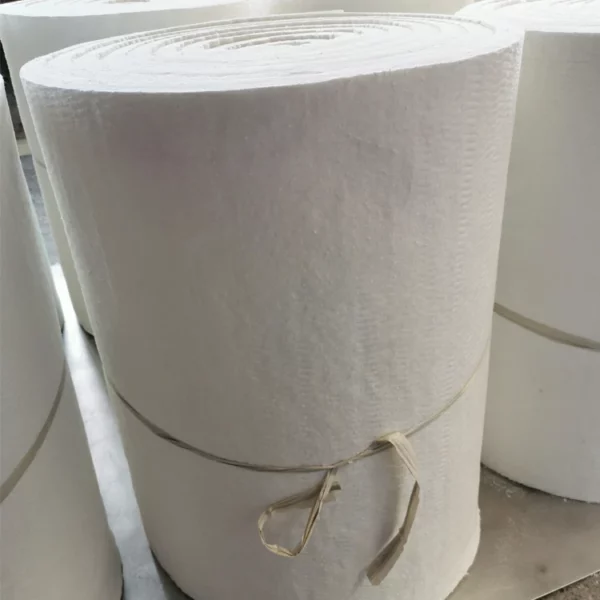Ceramic fiber insulation has gained widespread recognition as a highly effective solution for thermal management in various industrial applications. With its exceptional insulating properties and versatility, ceramic fiber insulation offers a range of benefits that contribute to energy efficiency, safety, and cost-effectiveness. In this article, we will explore the advantages of ceramic fiber insulation and shed light on its applications across industries.
Superior Thermal Insulation
- Low Thermal Conductivity:
Ceramic fiber insulation exhibits low thermal conductivity, thereby minimizing heat transfer. This property helps to maintain stable temperatures, prevent heat loss or gain, and improve overall energy efficiency in a wide range of applications, including furnaces, kilns, boilers, and piping systems. - High Temperature Resistance:
One of the key advantages of ceramic fiber insulation is its ability to withstand extremely high temperatures. With a melting point around 1430°C (2606°F), ceramic fiber insulation is suitable for applications that involve intense heat, such as metal casting, glass manufacturing, and high-temperature processing in the chemical and petrochemical industries.
Lightweight and Low Thermal Mass
- Reduced Thermal Inertia:
Ceramic fiber insulation has low thermal mass, meaning it heats up and cools down quickly. This characteristic enables faster temperature control, reducing energy consumption and enhancing operational efficiency in processes that require frequent temperature fluctuations or rapid heat-up and cool-down cycles. - Lightweight and Easy Handling:
Compared to traditional refractory materials, ceramic fiber insulation is lightweight and easier to handle during installation and maintenance. Its manageable weight simplifies transportation, reduces labor requirements, and contributes to faster and more cost-effective installation.
Excellent Chemical and Corrosion Resistance
- Inertness to Most Chemicals:
Ceramic fiber insulation is highly resistant to a wide range of chemicals, making it suitable for applications where exposure to corrosive or reactive substances is common. It helps protect equipment, pipes, and vessels from chemical attack and degradation, ensuring long-term durability and reducing maintenance costs. - Resistance to Thermal Shock:
Ceramic fiber insulation demonstrates exceptional resistance to thermal shock, enabling it to withstand rapid temperature changes without cracking or breaking. This property is particularly valuable in applications where heating and cooling cycles occur frequently, such as in furnaces, kilns, and thermal processing equipment.
Fire Resistance and Safety
- Non-Combustible:
Ceramic fiber insulation is non-combustible, meaning it does not support or contribute to the spread of flames. This characteristic enhances fire safety in industrial settings, providing critical protection for personnel, equipment, and structures. - Low Smoke and Toxic Gas Emissions:
In the event of a fire, ceramic fiber insulation generates minimal smoke and releases low levels of toxic gases. This feature is crucial for applications where the control of smoke and gas emissions is paramount, ensuring a safer environment for occupants and facilitating effective evacuation.
Versatile Applications
- Industrial Furnaces and Kilns:
Ceramic fiber insulation finds extensive use in high-temperature applications, including industrial furnaces, kilns, and ovens. It provides exceptional thermal insulation, helping to conserve energy, improve temperature control, and enhance productivity in heat-intensive processes. - Petrochemical and Refinery Industry:
The chemical resistance and high-temperature capabilities of ceramic fiber insulation make it well-suited for the petrochemical and refinery industry. It is used to insulate piping systems, reactors, furnaces, and other equipment, ensuring efficient operation and minimizing heat loss. - Power Generation:
Ceramic fiber insulation plays a vital role in power generation facilities, insulating boilers, turbines, exhaust systems, and other equipment. It contributes to energy efficiency, reduces thermal losses, and improves overall performance in power plants.
Ceramic fiber insulation offers a myriad of benefits, making it a preferred choice for thermal management in various industries. With its superior thermal insulation properties, high-temperature resistance, chemical inertness, 1430C Ceramic Fiber Blanket Ceramic Fiber Insulation and fire safety features, ceramic fiber insulation delivers energy efficiency, durability, and enhanced operational performance. Its lightweight nature, low thermal mass, and resistance to thermal shock further contribute to its versatility and cost-effectiveness. From industrial furnaces and petrochemical plants to power generation facilities, ceramic fiber insulation proves its value as a reliable solution for superior thermal efficiency and safety.

